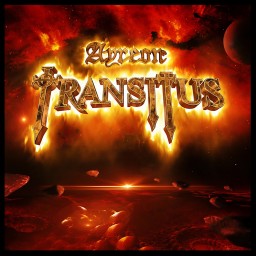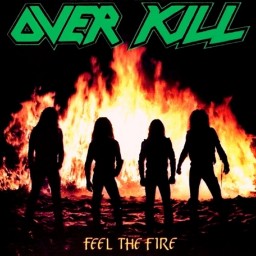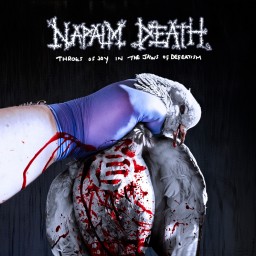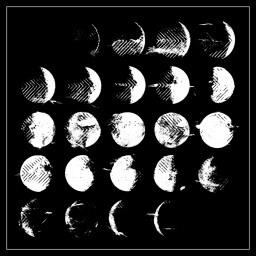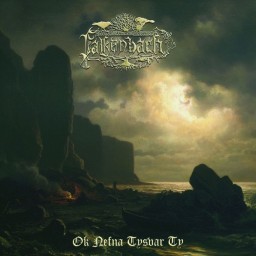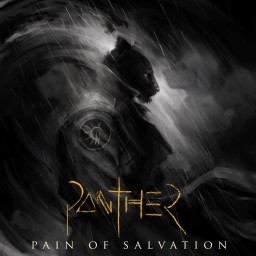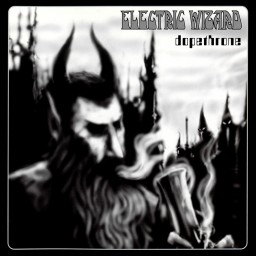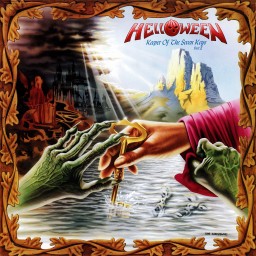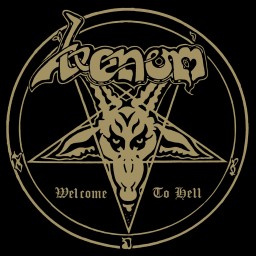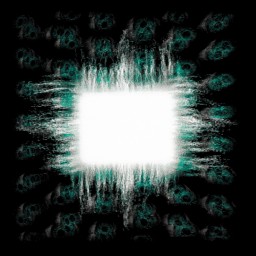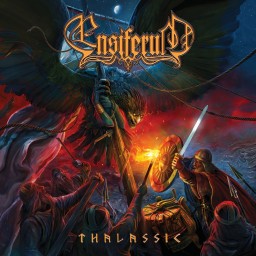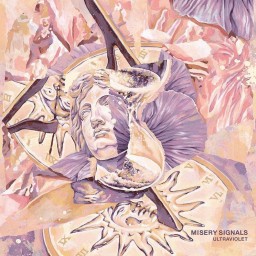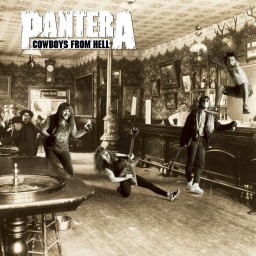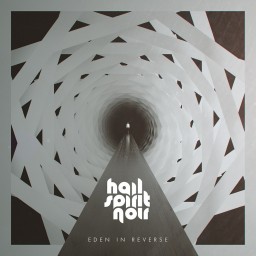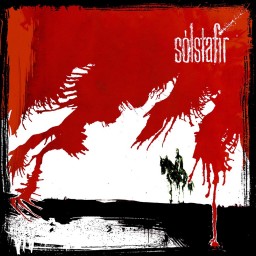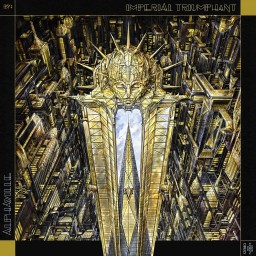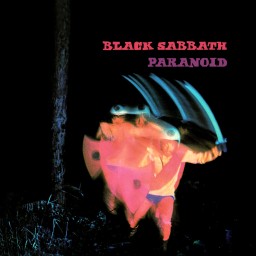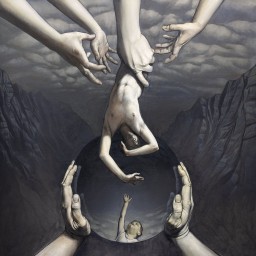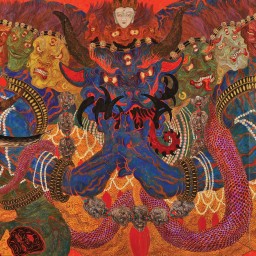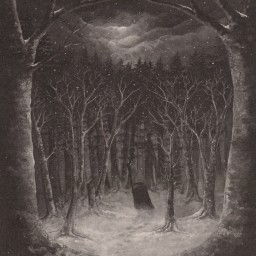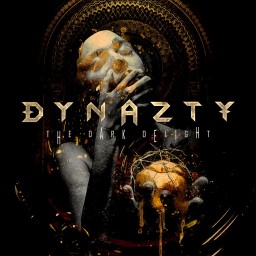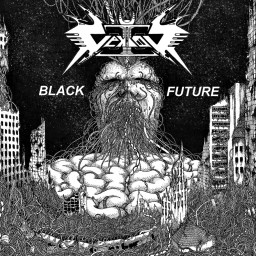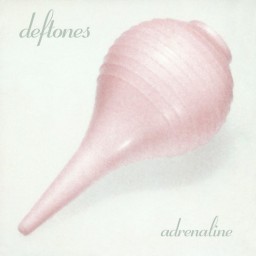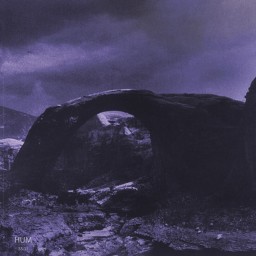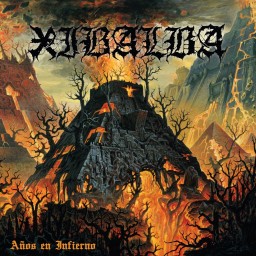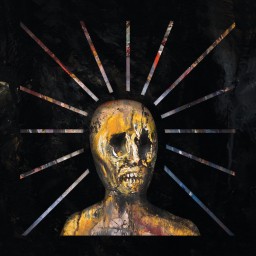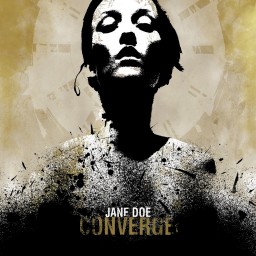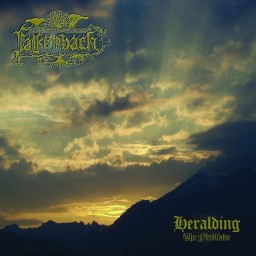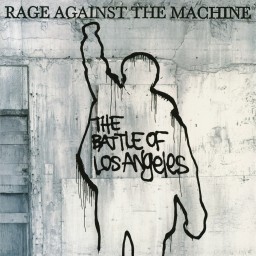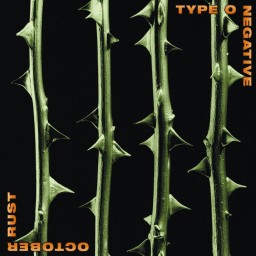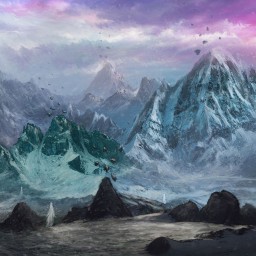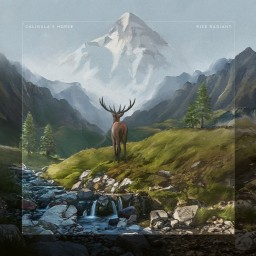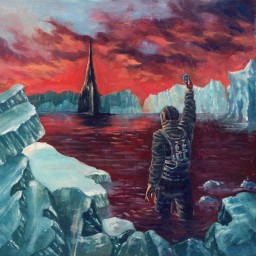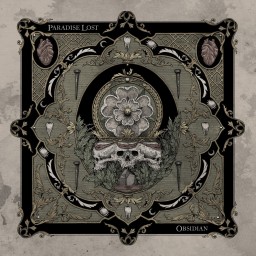Saxy S's Reviews
I do not have a problem with Arjen Lucassen breaking away from the “Forever” plotline. His 2013 album, The Theory of Everything, was everything that it needed to be; having the distinctive timbre of an Ayreon album, a fully loaded list of guest features, and a remarkable story connecting it all together. And, most importantly, it was the essential jumping on point for people like myself who wanted to discover the world of Ayreon, without having to go through a university course in understanding the lore (I’m looking at you Coheed and Cambria)!
So I was mostly excited to hear the band break off once again to tell a story all its own and it is certainly a good album, but I have a difficult time calling anything better than that. This does not even live up to the expectations of the bands worst albums.
Story is of course important in a rock opera and I feel like Arjen dropped the ball here. Transitus is, if we are being completely honest, a modified version of Shakespeare’s Romeo and Juliet; two star crossed lovers whose relationship is destined to fail and will bring down everyone else with it. The album’s setting is in the years of 1883 and 1884, and (minor spoiler) Arjen’s selection of Oceans of Slumber’s Cammie Gilbert as Abby is intentional, and the song “Dumb Piece of Rock” pretty much assures it. It is not a bad thing by any stretch, but perhaps these ideas could have been developed further, rather than “hey this is here!”. There are also major issues with Amanda Sommerville’s character, Lavinia, in the second half that I will not go into further.
Outside of that, the cast of characters is impressive: I already mentioned Cammie Gilbert and Amanda Sommerville, but you also have Tommy Karevik of Kamelot, Simone Simons of Epica, Dee Snider from Twisted Sister, and guitar solo features from Joe Satriani and Marty Friedman. And the production of this record is stellar, as you would expect. The vocal harmonies of the Angel of Death’s furries are excellent and mixed wonderfully, the wide array of instrumentation from flutes, violins, horns and even a hurdy gurdy are all given ample amounts of space to breathe during their features.
However, Transitus is nowhere near as concise as previous albums like The Theory of Everything. Almost two thirds of the record is short interlude songs that don’t fully develop or deliver much of a decisive punch as “Listen to My Story” or “Message from Beyond” do. Some themes do return throughout the record, such as the reprise of “This Human Equation” on the song “Your Story is Over!”, or how “Daniel’s Vision” borrows explicitly from “Seven Days, Seven Nights”. But they serve as simple callbacks, rather than as development of those themes.
I think the part that pissed me off the most is that this record is accompanied by a short comic book. I should not need prerequisite material in order to enjoy your album! Thankfully, Tom Baker begins every song with a preamble in order to understand what is going on, but Ayreon never needed that! The Human Equation, The Theory of Everything, The Source did not need narration. This feels like a step down for Arjen. I will recommend it based on quality and firepower alone, but do not be surprised if this album gets designated to musical purgatory (pun intended).
Genres: Progressive Metal
Format: Album
Year: 2020
In hindsight, if the big four had been expanded, you could make a legitimate claim that Overkill would be the group most deserving of a potential fifth spot. Their legacy is well established over forty years and have been releasing some high quality, old school thrashers on a relatively consistent basis over that time. And let's not forget this bands 1989 album The Years of Decay, which is a true classic in the genre in all senses of that word.
I say all of this in preface because I don't really care for the bands debut album, Feel the Fire. And when I some time to think about why that is, the answer is quite simple. The quality of what's inside is very rugged. In all honesty, it's many of the same issues that I had with Metallica's debut album Kill 'Em All from 1983. But even by that comparison, Metallica's album did feel well performed. With this album...I don't know; there are plenty of instances on songs like "Raise The Dead", "Rotten To The Core", "Second Son" and "Kill At Command" in which the band sounds like they are just about to fall apart with the tempo changes. And I don't mean that in a positive, progressive usage. These tempo changes sound like mistakes that were stapled together in post-production instead of getting the group to play it again and pray the drummer is using a click track. "Overkill" manages the transitions with a bit more fluidity, but those moments are sparse on this record.
The album also suffers from some really cheap sounding production. I know this is early 80s thrash: "iT's nOt sUppOsEd tO bE pOlIsHeD!" I hear you say. But the guitars are consistently peaking in the mix on side B, the bass presence is painfully absent outside a handful of small bursts, and the bass drum is mixed way too close to the front, which does drown out even the guitar riffage when heading into a double kick passage. When the riffs are audible, they sound fine, and I did not mind the band doing their own version of "Hit The Lights" on "Blood And Iron". The vocals are quite spectacular from a pure performance standpoint. The quasi sung/scream vocals of Blitz are very cool, even if his nasally vocal timbre can be an acquired taste. And he balances it out with some vicious howls like the outro of "Raise The Dead". As for the hooks themselves, there are some solid standouts, most notably "Hammerhead" and "There's No Tomorrow".
Here's the thing about Feel the Fire: many of my criticism's about this album are based off the fact that I have heard better, including from Overkill, thrash metal records in the years after 1985. And as I have said before, judging a bands debut LP to later albums is unfair. So if you are in the mood for some good old fashion thrashing, then Feel the Fire will probably be just the burn you're looking for. However, even by those standards, this does not even stand up favorably to the debut records from Metallica or Slayer from a couple years earlier. For as messy as those albums are, at least Show No Mercy and Kill 'Em All were produced better, and the hooks were more pronounced.
Genres: Thrash Metal
Format: Album
Year: 1985
It’s time to have the discussion on grindcore. For the longest time, grindcore was a genre that I was vehemently opposed to, as my limited exposure to the genre was more than enough to turn me away. Pig Destroyer, Cattle Decapitation, Dying Fetus, and a sprinkling of early Napalm Death was all I needed to hear; drawing on the worst elements of technical death metal, noise rock and metalcore that was not only unpleasant to listen to, but left with very little that was memorable beyond being loud and obnoxious.
But I told myself at the start of 2020 to listen to more types of metal, and to give older genres another chance. So here is Napalm Death’s newest album and...well this certainly is not the Napalm Death that I remember. They seem to be using a little more connectivity in their songwriting (they are thinking outside the mosh pit) and are incorporating hints of melodic phrasing in the music, which compliments the environment well.
That being said, they are still sprinkles on a grindcore doughnut. And this amalgamation of trans-fats are still ruthless in aggression. Songs like “Fuck The Factoid” and the title track are straight up mosh fests with blistering tempos, riffage and blast beats. Thankfully, the instruments actually sound pretty decent on this one. The production on this album is splendid and requires the music itself to create the uncomfortable atmosphere presented, instead of using blown out, messy presentation.
The vocals are good. Barney’s timbre is in the death metal vein (low guttural growls) and plays to the instrumentals very well. However, there are a handful of clean singing parts that just resort to monochromatic chanting on “Contagion” and “Invigorating Clutch”. I guess they are okay for what they are trying to do, but they feel really cheap and most people who listen to this will hate them anyway!
Overall, I didn’t hate this. Throes Of Joy In The Jaws Of Defeatism is handily the best grindcore album I’ve heard in quite some time (for whatever that’s worth). But it still doesn’t sell me on the genre as a whole. I mean, for a genre called “grindcore”, melodic development was never going to be a selling point. This is music for the mosh pits and for what it’s worth, this is good moshing music. I cannot deny fans that joy.
Genres: Death Metal Grindcore
Format: Album
Year: 2020
Well considering that my first Converge review didn't go so well, might as well give them another try right?
And here's the thing: when I started listening to Converge around the turn of the 2010s, I was still a relative noob in the Metalcore genre, and Mathcore specifically. I was listening to Trivium, Killswitch Engage, Protest the Hero (even though they are more Progressive Metal) and the like. I was still learning about the genre and how the best artists within this subgenre were able to craft these tunes with fluidity and beauty. Now Converge failed to deliver, at least in my opinion, through their first few albums, culminating with Jane Doe, an album revered by almost all who hear it.
So if I may be the lone voice yelling contrary into the void, so be it. Converge's All We Love We Leave Behind is significantly better listening experience than You Fail Me and Jane Doe, and is, in my opinion, Converge's best record.
For starters, the song structures found within this record are delivered with elegance. This album has a lot of tracks that are short (less than two minutes) and provide the listener with a hectic experience, but not one that feels overwhelming or overly brash. And not only that, but songs have legitimate forms and dynamic peaks and valleys. Now these occur primarily on the longer songs, such as the two most popular songs on the record "Sadness Comes Home" and the title track, but they also make their presence felt on "Coral Blue" and "Glacial Pace".
The riffing on this record sounds more pronounced and full than on any previous Converge album. Some of my personal favoutie cuts are the main verse (fast) riff on "Sadness Comes Home", and the punishing outro of "Glacial Pace". "Coral Blue" and "Veins and Veils" also have some tight grooves as well. And these ideas are developed as well, a technique seldom used in math rock/mathcore today. Sure "Sadness Comes Home" has a very quick turnaround from its intro riff into the verses, however that main riff returns as an outro. And even if it is one of the albums easiest songs to digest, it does set the table for what else is to come.
The production on this record deserves special credit. I have always been a stickler for this kind of stuff, but just because an album is supposed to be loud, aggressive, and atonal, it does not give the producers an excuse to make the songs sound like liquid ass. Bands such as Daughters have proven this in recent years and Converge helped set that band up for their success. The guitars are powerful, but not overpowering to make the bass sound like an afterthought. There are a few moments scattered throughout the album in which a rhythm guitar is surprisingly absent, leaving just a lead guitar and bass to push forward. And when those rhythm guitars do return, they hit with a greater impact knowing that their is that fundament bass line to flush out the mix. The percussion work on this album is very great. Since the album does alternate between hectic, hardcore tunes, and slower, melodic post-metal/sludge(?) ideas, Ben Koller fluidity between the contrasting styles is effective and shows enough restraint, not just in the performance, but also in the mix, not being pushed into the front ahead of the lead guitars, or Jacob Bannon. To be completely honest, the vocal performance is probably has the albums weakest moments. The quality and precision in Jacob's voice is dramatically improved from previous records, but it can feel pushed back in the overall mix a fair number of times.
When the band followed this record in 2017 with The Dusk In Us, a few people were surprised by the slower, more atmospheric change in sound and direction. But if you look at this album and my favourite song "Coral Blue", you would have already seen that change coming. Overall, All We Love We Leave Behind is a banger of a metalcore record from top to bottom. It redefines the frantic sound that Converge were known for at the time, while also laying the groundwork for where this group could go next. I never understood the mass critical acclaim for Converge...until I listened to this. Great stuff, but you probably knew that already.
Genres: Metalcore
Format: Album
Year: 2012
This is my second time diving into the world of Falkenbach and the subgenre of Viking Metal in more general terms. My first exposure was with this bands 2005 album Heralding and I really enjoyed what I heard; blending their unique folk traits alongside more traditional black metal tendencies.
So going back and looking at the bands previous album was exciting. I was anticipating seeing how the band got to their sound on that 2005 record. And what I ended up finding was... well it certainly isn't a bad record by any stretch; quite the contrary, actually. But this album feels far more simplistic than what would come later.
And perhaps that was apart of the bands appeal and purpose for the album. After all, this is Viking Metal. The Vikings are most notable as Norse legends and their journeys across the Atlantic Ocean with names like Erik the Red. And if you took away all of the metal indicators on this album, it pretty much sounds like re-imaginings of the sea songs that those Norse legends may have sung while traversing the heavy waters of the Atlantic. "Aduatuza", "Donar's Oak", and especially "Homeward Shore" fit in quite well with what Falkenbach is trying to envision.
That being said, there are problems. For one, the black metal elements are seemingly lacking in comparison to subsequent albums. Now this is a unjust problem to have; comparing records to albums that came later, but it does make the songs a lot less interesting. It seems like after the song "...As Long as Winds Will Blow", OK Nefna Tysvar Ty goes into a very comfortable sound, and does not venture away from it the rest of the albums duration. It can make an album that is relatively short, feel like its running long; not a good problem to have.
I also have concerns with the production. For one, the guitars are very simplistic, which is not a problem on its own. I actually quite enjoy the simple power chords anchoring simple one note vocal melodies. But the instrumental breaks are very hit or miss. Songs like "Donar's Oak" have flute's to carry a melody, but "Aduatuza" does not and it feels more like an extended jam rather than anything musically connected. And by the way, I will never understand why rock/metal bands use acoustic guitars as melodic instruments in front of electric power chords. The main melody in the acoustic is almost always drowned out and I question why it was even included on "Homeward Shore" at all, even if I do like the tempo changes and transitions on that tune in particular.
As it stands, OK Nefna Tysvar Ty is a strong effort by Falkenbach to recreate the traditional Viking sound, but with modern metal tendencies. And I think they do a pretty good job of creating that atmosphere for the listener. But at the same time, there has been a lot of Folk Metal, including from Falkenbach, that is more experimental and hits with more intensity than this.
Genres: Folk Metal Viking Metal
Format: Album
Year: 2003
This long running Swedish Prog Metal band has had some pretty incredible highs and some very forgettable lows. Pain of Salvation began in the 1980s and their initial output wasn’t much to write home about. Then the turn of the millennium hit and the band found new life with albums such as The Perfect Element I and Remedy Lane. Unfortunately, this band has returned back into safe territory since Road Salt One. And the band has begun incorporating djent tendencies that are all groove and no substance.
Their most recent album In the Passing Light of Day was a consistent album, but beyond a couple of decent singles, I found very little memorable about the album, even despite being overly generous three years ago. And now we have PANTHER, a more consistent album than In the Passing Light of Day, but less interesting.
For starters, since the band is loosely affiliated with Alternative Metal, I have a feeling that Pain of Salvation have become very tentative with their progressive tendencies in recent years. Beyond some odd time signatures and extended song structures, PANTHER does not stick out all that much. Sure, songs such as “UNFUTURE”, “WAIT”, “KEEN TO A FAULT” and “ICON” sound really nice, but what makes them stand out in comparison to the rest of Pain of Salvation’s discography?
The tracks that do stand out though are “RESTLESS BOY” and “PANTHER”. Unfortunately that is not a good thing. These are the worst tunes on the album as the former is the most blatant in its djent influence, and the later has rap verses that are poorly delivered and almost cringe-worthy in execution. They also have electronic elements as well and they sound forced in to create a more unique Pain of Salvation experience. I think that the album has some decent electronic elements, but they are few and far between.
Overall, I’m surprised by this new Pain of Salvation album. I wanted to like it more than I do, but Pain of Salvation is much less experimental than this album would suggest. And being accessible is not the problem; this could have worked.But I lose it with the faux rapping, djent breakdowns, and scattered production that has been consistent in Pain of Salvation albums for the last ten years.
Genres: Progressive Metal
Format: Album
Year: 2020
Drugs
I don't remember the initial reaction or acclaim for this record when it was originally released back in the year 2000. But oh boy, did I get familiar with it incredibly fast when I did discover it! Back when I was a blue blood in high school in the mid 2000s, I heard this album played religiously among my metal friends and all of our jam sessions were built around the Dopethrone framework. And, for a time, we had a ton of fun just getting really stoned, jamming out to Electric Wizard adjacent music, then smoking some more while the soothing sounds of Kyuss and Sleep engulfed us.
That was nearly fifteen years ago, and my opinions on musical quality have changed drastically, especially since I went to post-secondary school to learn from industry professionals. One of the things that I learned (perhaps counter-intuitively) was a memorable tune/hook or a musical idea/motif that would develop over a song/album's duration. Or, to put it in a different way, something that will grab your attention. As I learned that, my dependence on drugs as a gateway into different types of music became less dependent. And my love for Dopethrone deteriorated with it.
Don't get me wrong, I still do enjoy this album in certain situations. "Funeralopolis", "Barbarian" and "We Hate You" are shorter songs that don't overstay their welcome. And from a sonic perspective, this is the closest anyone has come in creating a hybrid of the slow, dirge-like tempos of Doom Metal and the intense crunchiness and aggression of Sludge Metal; a sound that has not been truly replicated since. However, the longer tracks ("Weird Tales / [et al.]", "I, the Witchfinder" and "Dopethrone") all have this incessant desire to just carry on without development. They stay very monotonous vocally and tonally, and they slow down even further, making them even more or a dirge than before.
For the purposes of this review, I re-listened to this album twice; once completely sober, the other after a few hits of the devils lettuce. And I found that my reaction in both scenarios were very similar. They were groovy as hell yes, but so much of this music was in one ear and out the other. I could feel myself falling in and out of consciousness as each new idea became indistinguishable from one another. While I was sober however, and actively hoping for something to latch onto, I found very little.
In the other scenario, it was a nice way to pass an hour plus without having to think about very much. And it was a brisk seventy-one minutes as well. So if I can recommend this, I would say listen to this album the way it was meant to be heard; in a haze of smoke. When sober, I put Dopethrone in the same category as I would include a lot of Deep House music; it works really well as part of a gaming/workout playlist, but that hardly constitutes a great album in my opinion.
Genres: Doom Metal Stoner Metal
Format: Album
Year: 2000
Power Metal has always been a very divisive subgenre with the metal community. This division has been a persistent issue since the genre's formation and boom during the late 1980s and into the 1990s. And Helloween are this genre tags most well known and respected band. Their debut E.P. as well as the three subsequent full length albums that followed, are considered high art by those who enjoy it.
Now, forgive me for being naive, but I've never cared for Helloween. I have always believed that when matched side by side with the artists that they were trying to invoke, Helloween always felt a step down. Their biggest love is clearly Iron Maiden, and that is a high bar to live up to for sure, so I don't blame them too much for that.
What I will say is that in comparison to the power metal bands that followed into the 1990s, Helloween did not age very well at all. And Keeper of the Seven Keys Part II is no exception. The production and compositions on this album falls very flat very quickly. For starters, the guitars are not mixed all that well. Sure they sound fine, but many of the rhythmic passages feel undercooked and lacking a significant low end to really drive them forward. The melodic passages are much more enjoyable because the bass does sound pretty good throughout the entire project thanks to Markus using the fretless variety. Percussion is pretty standard by definition in Power Metal. And Michael Kiske does a very solid Bruce Dickinson impersonation here, but loses his individual identity pretty quickly.
As for the compositions, I found far too many times that the tempo changes and development of ideas felt forced. The tempo changes just show up out of nowhere with nothing to prepare them and the development tries overlaying some melodic counterpoint in the lead guitar or vocals, but doesn't introduce these ideas initially to make the combining of the two hit harder. And of course, the hooks. For as nice of a sound that Helloween may have, I cannot recall at least half of this album. I mean, the album starts off very well with "Eagle Fly Free" and I have a blast with "March of Time", but tunes such as "Rise and Fall", "Mr. Stein" and "We Got the Right" are just in one ear and out the other.
For comparison sake, I decided to listen to Queensrÿche's album of the same year, Operation: Mindcrime. And what I ended up finding was an album that was able to grip me and carry me along for the ride with greater consistency. As for Helloween, I won't deny that they do have a mostly enjoyable sound and I am not going to shun anyone for enjoying them. But Keeper of the Seven Keys Part II offers a lot less today than it did back in 1988 and Blind Guardian easily surpassed them entering the 1990s.
Genres: Power Metal
Format: Album
Year: 1988
What do you get when you cross New Wave of British Heavy Metal, early Motörhead adjacent speed metal, and the original hardcore punk scene of the 1980s? Well you probably end up with a band like Venom and their legendary debut record Welcome to Hell.
Now for an initial playthrough, that might seem like a lot to digest. But Venom are not only able to pull off the best elements of each playbook with fluidity, but they also managed to create an album that has stood the test of time remarkably well! To be completely honest, I had never listened to this album in its entirety prior to writing this review, but I immediately recognized some of these tunes as soon as they began playing, without being aware that they were Venom songs. That is a true testament to this bands legacy.
Of the three branching genres that I could recognize while listening to this record, NWOBHM is the tag that I would attest to this album the least. In contrast to other artists who were releasing similar sounding music around the same time, Venom were far more crunchy than their contemporaries. The riffage on "Welcome To Hell", "Poison", "One Thousand Days of Sodom" and "In League with Satan" is unlike anything you would expect to hear on those early Iron Maiden and Diamond Head records. The vocal timbre is less power metal and more thrash, the riffs are faster and more distorted, the hooks are less anthemic, but somehow resonate just as effectively. Perhaps the tag of Speed Metal would make more sense.
But I hear a lot more distortion and alienation from Venom than a group like Deep Purple or Motörhead. No, the genre that I tagged Venom as was Original Hardcore Punk. While bands like the Dead Kennedys, Black Flag and Bad Brains were gaining attention in the United States, Venom were taking that sound and implementing it over these NWOBHM/Speed Metal compositions and it sounded phenomenal. The albums starts with "Sons of Satan" and while the hooks might not be there, the fast tempos are. The distorted riffs are very powerful, and anchored by some very solid bass, while the vocals is howl-singing, like you would hear in Black Flag or Bad Brains.
But what separates Welcome to Hell from other Hardcore Punk albums of the eighties is its forward thinking. While you might not hear it initially, Venom were stoking the flame for a new generation of metal. One that took it to the extreme, literally. "Witching Hour" and "Red Light Fever" are the basic foundations of black metal with its tremolo riffs, relentless percussion groove and howled vocals. Throw on top of that all of the Satanic imagery and scattered atonal soundscapes found throughout the project and you'll find a lot of appreciate here.
Upon listening to Welcome to Hell, I quickly realized how much gross influence this album has had within heavy metal, as well as how wide of a range its intended audience is meant to be. Is it Speed Metal? Is it Hardcore Punk? Is it Black Metal (no it isn't, but the recurrent themes do bring an interesting point)? No matter what angle you view this album from, Venom's debut record is one for the ages.
Genres: Heavy Metal Speed Metal
Format: Album
Year: 1981
I have a long history with this band. Tool were the band that initially forced me to crossover into the world of heavy metal back in the year 2001. I guess you could say they were my "Gateway" band (forced pun intended). And for a while, I believed the hype when it came to the bands 1996 album, Ænima, regarded by many as the bands best studio album, even ahead of Lateralus. Now I gave that album the illustrious perfect score when I reviewed just a few months ago. And while my opinion on that album may be tainted by rose coloured glasses, I still consider that record to be one of the all time greats, and a top ten greatest album of all time.
Ænima meanwhile, has not aged nearly as well. For starters, Ænima continues following the trend of the bands debut LP, Undertow by having a decent blend of progressive rock song structures/forms, while still maintaining some solid hooks from Maynard James Keenan on vocals, anchored by strong fundamentals by Justin Chancellor on bass and Adam Jones on guitar. "Stinkfist" starts the album with a thud and that carries on well into "Eulogy", but it does not stay in that vein for very long. "H." and "Hooker With A Penis" feel more like free-form tunes that yes do have good grooves, mostly on the former, but no hook to speak of. "Forty Six & 2" has more form, but lacks a melodic hook beyond the introductory bass groove. "Jimmy" and the title track are very good, the latter being one of Tool's top ten songs, while I personally have a strange fascination for "Pushit".
The sound of this album is unique for Tool. It was clear from the beginning that these guys were fans of some of the heavier grunge rock bands of the early nineties (Soundgarden and Alice in Chains specifically) and were working on creating a hybrid of Alice in Chains' heaviness, and Soundgarden's more progressive songwriting/structure. But this time around, Tool made the pivot to make a sound all their own. And I wished I liked it more. Many of the individual tracks seemingly run together after a while without any discernible key change or drastic tempo alteration. On their own, they are quite fine, but as a collective unit... I dunno, just really falls flat.
But outside of the music itself, what really holds this album back from the higher echelon that is the rest of Tool's discography? One word: framing. This album is FAR too long and trying way too hard to be tongue in cheek. Tool have never taken themselves very seriously; for god's sake, Undertow has a song called "Prison Sex"! The title of "Stinkfist" is another that tries to be provocative, while hiding a message/observation at large of people taking extreme measures to obtain pleasure, or "Hooker With a Penis", which responds to fans who claim they "sold out" as well as with "Pushit".
But what really grinds my gears is the interludes. My god. "Useful Idiot", "Intermission", "Cesaro Summability" and "(-) Ions" are literal noise interludes that contribute nothing to the experience. While "Message To Harry Manback" and "Die Eier Von Satan" might invoke a chuckle or even a full on laugh upon first listen, but what was the point of including a cookie recipe in German, over some percusssive, industrial groove? It loses it humour very quickly and these tracks have become near immediate skips with every subsequent listen of Ænima.
I understand the gatekeeping that Tool fans have, but much of that is at the hands of the band themselves. Tool are clearly not interested in dumbing down their music to a wider audience. They demand your attention in order to appreciate the songwriting and the word painting in the music. But Ænima is the album that achieves this the least effectively. You might like the singles: "Stinkfist", "Forty Six & 2", "Ænema", but be prepared to be left confused if you try and listen to this album in its entirety. It actively feels like the band is trying the alienate themselves from the mainstream, and perhaps, even their audience. And in one humble reviewers case, it almost worked...
Genres: Alternative Metal
Format: Album
Year: 1996
Folk Metal is not a descriptor that I take with much consideration. Folk tendencies can be carried across any genre of music to accentuate melodic and scriptural themes. And Power Metal seems to be the place where it is surprisingly absent. Stylistically, it makes a lot of sense, since both are storytelling genres, as they talk about “folklore” and mythology.
Ensiferum have been around since the mid 1990s and Thalassic is their eighth, and most recent, studio album. And their blend of Power and Folk Metal work together incredibly well. I wish I could kick myself for not discovering them sooner.
For starters, they have a very unique sound. One that combines said Power and Folk Metal, as well as some very welcome Melodic Death Metal trends that I am a sucker for. The comparison that I made was to the French band Aephanemer.
Musically speaking, these are very well constructed Power Metal songs with some great production. The bass is fluent and carries these songs on their epic adventures, the melodic hooks in the vocals, guitars, and other folk instrumentation is solid, and the band is able to show off a diverse palette of sounds, without highlighting any true weaknesses. The mixing of the album is very good as well. There is a lot of double bass drum on this album, so balancing that with the melodic instruments is key and I think they did a very good job. The only thing that threw me off were some of the gang vocals feeling overly accentuated, such as on “One with the Sea”.
The end of this album tossed me another curveball as well and it left a bitter taste in my mouth when it was over. “Midsummer Magic” is a goofy jig that feels out of place with what transpired previously. And on the closing track “Cold Northland”, the bridge goes into a true melo-death riff, complete with percussion blast beats. I still like the song, but it felt out of place when it has been noticeably absent for the first eight tracks.
Still I really enjoyed this. This album's first seven tracks more than make up for its questionable direction in the final two and is just a lot of fun. It features some of the bands best individual songs and that’s high praise.
Genres: Folk Metal Power Metal
Format: Album
Year: 2020
This is the first full length release by California based metalcore band Gulch and has been receiving a lot of positive praise from critics. To me I found this very surprising considering the albums runtime is only about fifteen minutes. What could possibly be going on here to stand out this much in 2020?
Well, I'm not too sure. I think that for as aggressive and relentless as this album is, the short runtime is to its benefit. The grooves are pretty solid throughout and the howling vocal delivery is pretty damn awesome!
I say all of this because the album does not have the same sort of crispness that we expect to hear from others in the genre, specifically The Dillinger Escape Plan. This record seems to share a lot more in common with Jane Doe era Converge. For one, the production is really sloppy; the guitars have this continuous buzzing throughout the record, separate to the percussion. The bass is practically non-existent on this album, and while the percussion is impressive and mixed the best of all of the instruments, it never gets its own opportunity to shine behind the aforementioned rattling in the guitars.
The other comparison point to Converge is the song structures. I have gone on record many a times disparaging mathcore and its incessant flailing around tempo/time signature changes as hook-worthy, instead of crafting actual grooves or melodies that are recognizable beyond the avant-garde tempo stylings.
Mathcore is not my thing, nor do I think it will ever be my "thing". And this album is not going to change my mind, even if it does take some decent steps into changing my mind. A curious listen for sure, but not memorable beyond it's minor Grindcore leanings.
Genres: Metalcore
Format: Album
Year: 2020
For the first time in seven years, Misery Signals are back with a full length studio album. And this time they have recruited their original lead vocalist, Jesse Zaraska, after a very successful ten year run with Karl Schubach.
And while my history with Melodic Metalcore is expansive, it isn't a genre I typically return to all that much. Part of that is how samey much of it sounds. And this album is no exception. I tried to craft this review without mentioning that these guys sound way too much like August Burns Red. But I just couldn't do it. The comparisons are almost too obvious to miss. They've even gone so far as to start modulating with the song structures. "River King" and "Some Dreams" are Constellations era A.B.R. to a tea.
The mixing is pretty good. The stylistic changes from faster, hardcore passages to slower, breakdowns is decent. The softer passages that break up the heaviness of this album sound okay. "Redemption Key" feels a little too soft in the mix overall, causing the metal breakdown during that tracks final third to be a bit too harsh.
But I grew up with a lot of this stuff, so my criticisms are muted because I appreciate a good Melodic Metalcore album, in a genre littered with Car Bomb's and Fit For An Autopsy. Tunes like "Sunlifter" and especially "The Fall" are tuneful and fun. But even by those standards, this album still feels very safe. Fans of Misery Signals, as well as Melodic Metalcore, will probably enjoy this, but everyone else may treat this as just like any other Melodic Metalcore album.
Genres: Metalcore
Format: Album
Year: 2020
For Pantera, Cowboys From Hell may as well be there freshman album because it saw the band ditch their 1980s power metal influence in favour of something that resembled thrash metal, but not fast or sonically aggressive. That right everyone, it's the birth of "Groove Metal"!
Now while Groove Metal has had its time in the spotlight during the 1990s and early 2000s as the prominent, mainstream subgenre of choice, Cowboys From Hell is still very transitional. This album still has grooves that are highly reminiscent of the early power metal era Pantera. These are mostly found on the albums promotional singles: "Cowboys From Hell", "Domination" and to a lesser extent, "Cemetery Gates". By comparison the extreme chugging of "Psycho Holiday", "Heresy" and "Medicine Man" are very forward thinking for their time.
I'm not going to lie, for an album as iconic as this, I would have expected to be better produced than this. The volume mixing is incredibly offsetting. Like how "Cemetery Gates" is mixed much quieter overall, leading into its fade out ending, but is then immediately followed by "Domination", which is much louder all around. The two songs in consecutive order sound like they were composed for two separate albums. And not's even including the unsettling nature of some of these instrumentals. Dimebag Darrell's guitar is very sloppily mixed from one song to the next. At one moment, the guitar is drowning Anselmo's vocals and at the next, Anselmo is all you can hear! And I can't not talk about the awful reverb effect in the percussion that absolutely ruins the iconic headbanging drop/riff on the outro of "Domination".
I'm sure that there are countless remastered versions of this album that is now in its thirtieth year in circulation that can fix many of these problems that i have with it. Because the "grooves" themselves are sticky as hell! The explosiveness of "Primal Concrete Sledge", the iconic riff that wraps up "Domination". I still really enjoy the title track and all of the pinch harmonics and other guitar effects that Dimebag incorporates throughout the record. One thing that I really enjoy from a songwriting point of view is the absence of a rhythm guitar during the solos. I do not know how prominent of a songwriting tactic this was before Pantera, but my goodness! The space in which Dimebag has to breathe in tremendous, and is anchored by some very good bass work. Unfortunately, it does not last; "Message in Blood" and "The Sleep" are serviceable tunes that do nothing to further develop the sound from the first half of the record.
Phil Anselmo's vocal presence on this album is very rough. It's more of a quasi sung, but it contains a lot of natural rasp and is harbored by some Chuck Schuldiner esque shrieking. As Pantera would double down on their Groove Metal sound on later records, Phil's vocals would become more stable and would rest in a very comfortable scream. I like how he uses his full vocal range throughout the album, even incorporating some "clean" singing on "Cemetery Gates", which would help influence some of Pantera's superior "ballads" on later albums.
I'm not gonna lie to you guys, I still enjoy this album quite a bit. And while the overall production is all over the place and does hold the record back, that's not the reason why I am not as high on this album as so many others. My opinion on Pantera as a whole has been skewed over the last fifteen plus years since the passing of Dimebag Darrell. Pantera have been gifted the status of "heavy metal gods" by countless fans of this band as well as by mainstream metal press. That also somehow included a "free of criticism" pass. I have gotten into more than one triggering argument with fans of this band for daring to critique the band and this specific album. To be honest, I'm kind of burnt out on Pantera. Not just by their music, but also their fans who relentlessly shove it into my face how great of a band they were and that Dimebag was a legendary guitar player, etc.
Throw on top of that the questionable antics that Phil Anselmo has continued to get himself into over the last few years, and those same fans will not call him out for it is kind of disgusting. Pantera's legacy is secure within the annals of heavy metal history and they served their purpose. Their brand of fist clenching, aggressive thrash metal is just what teenage adolescents needed (such as I was when I discovered it) and also helped pave the way for a completely new genre of heavy metal. But for me, that rodeo has passed.
Genres: Groove Metal
Format: Album
Year: 1990
For Hail Spirit Noir, a heavy metal band from a region in Central Macedonia, Greece, they have shown a lot of potential throughout their previous output in the last decade. Starting off as a black metal outfit with psychedelic elements, the band flipped their script with 2016’s Mayhem In Blue as they added progressive/avant-garde elements into their work. Well, maybe that isn’t fair; these elements were always present, but now the band was pushing them to the front of their work.
Eden In Reverse takes this transition another step further as many of the black metal elements have been discarded for more “traditional” progressive metal tropes. The band's biggest selling point is their use of analog synthesizers as melodic framing devices. Some might find this sound alienating, but the implementation is executed strongly. They do provide some very sticky hooks, while the guitars provide some warm chord progressions. I will admit though that they can become overwhelming at points, especially on the closer “Automata 1980”. The bass and percussion work is balanced out pretty well overall in the mix. I will say that the weakest element is the vocalist. There are some decent moments, but most of the time they feel very monotonous.
The band's sound is a little bit hard to pin down. I already mentioned off the top that this band started off with black metal tendencies, and most of those are absent here. But the synths from those early days are still present, providing a spacey environment that is not grounded. The two early comparisons that I made were to mid 2000s Opeth, as well as the same stylistic transformation that Borknagar made in the last decade. Both of these are good sources to aspire to, and the synths once again do provide some originality, but I think that the band could have gone the extra mile to make themselves stand out even further.
As it is, I did like Eden In Reverse. The transition from extreme black metal to psychedelic, progressive metal was pulled off well with some positive rewards. But the feigning identity may be to this band's detriment in the future.
Genres: Progressive Metal
Format: Album
Year: 2020
Before Deafheaven's 2013 sophomore album Sunbather was released, the genre that we now know as "blackgaze" was still very much in its early development; the word "blackgaze" being simply a compound of black metal and shoegaze. Anchored by an artist such as Neige and his bands Alcest and Amesoeurs, the tag of blackgaze could best be described as "shoegaze with black metal elements". And I can completely understand why, if you were a fan of heavy aggressive nature that the title "black metal" suggests, blackgaze wouldn't have been your cup of tea.
Deafheaven decided to flip that script with their "black metal first, shoegaze second" approach to the genre. And it helped them out...for better or worse. The band's 2013 sophomore album Sunbather is one of the most discussed records of the entire 2010s decade, period. It will also most likely go down as that decade's most important metal album based on cultural impact alone. Before you've even started listening to "Dream House", some metal purists would be shocked and disgruntled by a bright pink album cover that could not be missed. What about Boris' Pink?
But enough about the albums history, how does it stand up as a piece of artwork? Well it certainly is eclectic. I know why this album is deemed controversial and why the typical consensus is either complete infatuation or outright disgust. I see myself on the former side of the aisle, but I do see flaws within and it is important to highlight them.
For one, unlike most black metal (including early blackgaze), the major key harmonies are jarring. For a genre that is viewed as having a generally cold atmosphere, why did Deafheaven create something so warm and longing?
For a blackgaze record, it does not really meet too many of the qualifications that title would suggest. Shoegaze is typically very slow, dreary and, as its name suggests, invokes bending your neck forward and looking down at the floor. This record is far more uplifting than that. Lots of fast tempos, blast beats and ferocious howls from George Clarke. It is more reminiscent of something you might hear in post-metal or atmospheric black metal. The jarring dichotomy of the two emotions together create a one of a kind heavy metal experience. "Dream House" is still my favourite Deafheaven song, but the beautiful song structures and formatting of "Sunbather" and "Vertigo" make them instantly recognizable. Unfortunately for me, the album does lose steam near its conclusion; the major harmonies of the first two/three songs vanish with "The Pecan Tree".
One thing that I greatly appreciate from the world of atmospheric black metal is the song structures. This is still a black metal record first and foremost, but you have to give your listeners a moment of reprieve; to collect their thoughts before the next wall of sound assault comes the listeners way. Deafheaven get that, and while their are some really long songs throughout the project, none of them feel "long". Quite the contrary, in some cases, especially on "Dream House", "Sunbather" and "The Pecan Tree", the songs almost end prematurely. "Vertigo" by contrast starts with clean guitars and soft percussion and evolves into distorted tremolo picking, blast beats and Clarke's shrieking. The album also includes some separate interludes as well, including the very pretty "Irresistible", the unsettling intro before transforming into acoustic guitar strumming on "Please Remember", as well as a spoken word interlude on "Windows" just before the finale. That last interlude does not really add much to the overall experience in comparison to the other breaks.
On a record such as this, production is key. You do not want the mix to become overwhelming when everyone is playing this fast and all at the same time. Thankfully that does not seem to be very much of an issue during the instrumental passages. Some of the electronic elements, most notably the first section of the interlude "Please Remember" sound really cheesy. Also, Clarke's vocals always feel as if they are being drowned out in the mix. Perhaps par for the course in this branch of black metal, but something that may have been overlooked.
So who is this album for? It's major harmonic song structures make me believe it is meant to be more mainstream "accessible" black metal. The vocals suggest otherwise. As a black metal album, it is solid as well, but as mentioned at the start, some metal purists just don't like change and they will dismiss this record simply based on principle. Deafheaven found themselves between a rock and a hard place with Sunbather, an album meant to please everybody, but perhaps found themselves more isolated than before...at least initially. Rest assured, with bands like Alcest still around, as well as new faces such as White Ward, Sylvaine, and Harikari For The Sky(?), Deafheaven expatiated the process for a new wave of heavy metal. I think we should bask in its rays.
Genres: Black Metal Post-Metal
Format: Album
Year: 2013
After listening to Sólstafir's 2009 album Köld for a previous featured release in The Infinite clan, I had some questions. Questions about the longevity of this style of post-metal. One that borrowed a lot from progressive metal tropes of songwriting and how long this band could get away with it. To put it lightly, Köld is exactly what I would expect an ex-atmo black metal band to make, if they were to take the plunge into post/progressive metal.
Now the 2011 album, Svartir Sandar sees the band now established within the genre, their black metal roots are behind them, and have the freewill to play whatever it is they want to. And this record is certainly a step up from that last album. I like how the album builds a nice pace and tells a story through its instrumentals; the heavier sections are contrasted beautifully by softer, lush clean sections. The songwriting has improved greatly as well, weaving in and out of ideas and phrases to create a nice little narrative.
However, the production has taken a bit of a hit, especially in the albums louder sections. Such as the opening track "Ljós í Stormi" as well as "Þín Orð". The percussion is really loose and there are some portions on this record in which everything is being drowned out by the crash cymbals and the clicking heavy snare drum. And don't think that I didn't notice on the opener the missed cues by the drummer.
And this persists on the second disc of this album as well. I do feel like the overall sound quality made an improvement here in where the bad moments only appear in short spurts, rather than persisting throughout. Like on the outro of " Melrakkablús" and the section just before the transition on the title track. I really like what the band did here; the transition on "Svartir Sandar" sounds brilliant and the ominous choral arrangement near the outro sound gorgeous. Which leaves us with the trio of "Draumfari", "Stinningskaldi", and " Stormfari". These three tracks together create an interesting environment, but the middle portion loses momentum very quickly. I think the band knew they could combine all of these songs together, so they would split it up and it probably worked out for the best so I can skip the middle portion.
I will say that starting and ending the record with two songs both eclipsing ten minutes is a bit of a gamble, but it surely paid off. " Ljós í Stormi" and "Djákninn" are crafted very well and tell excellent stories. Despite my own personal quibbles with the production, overall, I think that Svartir Sandar is the superior record to Köld. It's a shorter record, but no more endearing than the previous album, the songs are better constructed and the final steps in the complete transition away from black metal have been fully realized.
Genres: Post-Metal
Format: Album
Year: 2011
I may not be the best person to talk about this kind of music, but fuck it here I go! I have never been all that well versed in the world of technical death metal, but in 2020 I have forced myself to try and see if there is anything within the genre worth my attention. It started off with a really good new record from Ulcerate, followed by a dive into some new technical thrash/death with Cryptic Shift, and now we have Imperial Triumphant’s fourth album Alphaville; and the strangest of them all.
I don’t even know where to begin with this thing. The atonality found within is terrifying, even more so when it immediately follows an extended softer reprieve passage. I feel like this album is borrowing much more from a band such as maudlin of the Well or Kayo Dot. Hell, this record has more than it’s share it common with the last Oranssi Pazuzu album. The first half of this project is brimming with time signature changes and unconventional instrumental techniques. The second half does become a little more musical, highlighted by the horn solo that leads off “Transmission to Mercury” and late complimented by blast beats and tremolo picking guitars.
The production helps save this record’s first half by being prim and proper. The guitars are relatively quiet in the mix, but highlight some strong foundations in the bass, but more importantly, the howling vocal mix of Ilya Goddessraper, the eerie vocal choirs that persist throughout the project and the occasional horn breaks. On an album as alien sounding as this, one small falter in the mix could spell disaster, and I think the group and their producer did an excellent job of not allowing the cacophony of sounds to become overwhelming, since the music will do that itself. When it gets to “Atomic Age” and “The Greater Good”, the mix can get a little rougher because the song structures are generally more favourable.
I had no idea what to expect out of a record like this and I am proud to say that the crushing atmosphere is delivered with grace. I can’t say I will return to this all that much, but the invitation is always there.
Genres: Avant-Garde Metal Death Metal
Format: Album
Year: 2020
Let There Be Nothing is the fifth studio album from Arizona based power metal outfit, Judicator. And the question that should be at the top of everyone’s mind is: who the hell is Judicator? I had never heard of this group until recently so I decided to give their newest album a listen and...well I see why I only just discovered them.
The power metal elements that are on display here are very pedestrian. The over the top vocal arrangements, plenty of guitar solos and riffage is all stuff that has been played to death in recent years, including by Blind Guardian, the band that Judicator is explicitly trying to imitate. I will give the band some credit as the production of the album is pretty good, especially in the low end.
But that leads me into something that I don’t usually discuss when reviewing albums (although it is very much implied): the performances. Dear god, this percussion sounds awful! It is so muffled in the mix that much of the groove falls flat The bass player tries their best to fill out the space leftover with competence, but then you also have to consider that many of these beats are delayed, making everything else fall out of sync. Also John Yelland is no Hansi Kirsch, no matter how desperately he tries.
Compositions are pretty standard power metal. I like the tremolo picking guitar leads that are reminiscent of black metal on “Autumn of Souls” and the opener “Let There Be Light” is a decent starting point. But the rest of the album falls through some baffling cracks. Like how so many of the songs (especially “Strange to the World”) have transitions between different ideas that aren’t so much weaved together as much as they are slapped together with arts & crafts glue that you would have used in elementary school. And when the tracks feel even longer than their runtime entails, that’s a big problem.
So uhh… not really a good jumping on point I would say. Judicator is not reinventing any wheels in power metal at the moment. And if that works for them, then so be it. Just don’t be surprised if we get really tired of it very quickly.
Genres: Power Metal
Format: Album
Year: 2020
Well, here we are, the album that started it all. The album that began a new revolution in music. A revolution, which without, this website would never exist... at least if you believe the mainstream. Paranoid is actually Black Sabbath's second record, also released in the same year as the self titled debut.
Fifty years ladies and gentlemen. It has been half a century since Ozzy Osbourne formed Black Sabbath and changed the landscape of rock music forever. And I have very little to add to the discussion about this record that has not been said countless times across countless websites like Metal Academy, RateYourMusic, and other critic sources. So allow me to add some very short, but much needed dissent in relation to this album: it is not as good as the self titled debut.
Oh it starts excellent: the opening track "War Pigs/Luke's Wall" has a great opening riff and the siren before the opening is the perfect, ominous opening that an album of this magnitude needs. The album has songs that are sacred among the metal community: "Paranoid", "Iron Man", and "Electric Funeral", although "Hand of Doom" is my personal favourite and the one song that gets slept on by far too many.
The production on this record is quite solid even for its time. Lots of bass presence and the distortion of the guitars gives it the crunch without compromising the lower end. The vocals are iconic at this point and Ozzy's vocal timbre is still heard attempting to be replicated to this day.
But here is where my major gripe takes place. Paranoid is too commercialized. Now I will admit that accessibility is not always a bad thing, but it is quite clear to anyone who listens to the first record that this group doesn't want to be on the cover of Rolling Stone or some other music publication magazine; Long songs to go along with its doom like content. Paranoid meanwhile chooses shorter songs, more groovy tunes and clearly plays into a Led Zeppelin/Deep Purple vibe. For lack of a better term, this album falls by the wayside in comparison to the following bands that it influenced. S/T meanwhile was one of a kind.
I feel like Paranoid is remembered more fondly because of its singles rather than its influence. And I don't think that any of the singles on this record are bad; quite the contrary actually. But like with all styles of music, a root is not necessarily the prettiest thing to look at. It's not until you've watered it and let it grow that you witness your plants true beauty.
Genres: Heavy Metal Stoner Metal
Format: Album
Year: 1970
I've never liked Primus. I was probably a little too generous to this group when I reviewed their debut 1990 album, Frizzle Fry four months ago. I liked how the group was not going to take itself incredibly seriously and how the music found within was obtuse. But at the same time, it left me with very little to latch onto. Without any hooks or recurrent motifs, none of those songs held any weight for me.
So with their 1991 follow up, the band seemingly took many of their most experimental elements from the last album and turned them up to eleven (pun intended). The production certainly took a drastic step in the right direction from the last album, which did make this not a completely terrible experience listening to!
As I said, the sound of this album has certainly cleaned up since the last record. The guitars are very subdued and you would be hard pressed to find any legitimate power chord passages, or at the very least, find any that lasted more than eight bars. This allows for the bass to take center stage, and there is a lot of good stuff here. The riffs on the albums trilogy of good songs, "American Life", "Jerry Was A Race Car Driver" and "Eleven" are delivered with crispness and precision. As for Les Claypool's vocals? They are far more deliberately alienating than on Frizzle Fry, which will turn some people off. But the alienation is apart of Primus' appeal, so I can't criticize it too heavily.
What I can criticize is the songwriting. I don't care how experimental you think you are, if you cannot come up with the hooks that stand out, these songs won't last very long. I already mentioned my personal favourite part of the record, and I can't deny that "Tommy The Cat" succeeds as well (mostly because it's just "Jerry Was A Race Car Driver" 2), but beyond those songs, I can't remember a single thing here. The guitars contribute very little to the tunes; mostly just wanking around and couldn't be bothered to learn the proper keys before recording! As for the melodic motifs, they sound so basic have very little development throughout each songs runtime. It makes them very tiring, very fast. What's even worse is that the album ends with two songs, "Those Damned Blue-Collar Tweekers" and "Fish On (Fisherman Chronicles, Chapter II)", that exceed five minutes, the latter almost reaching eight! These songs don't deserve their runtime's and just feel like extended jam sessions.
Overall this record frustrates me more than any other Primus album. I do like the evolution in the production and how it allows for the dissonance in the instrumentals to sound bearable. But the developments in the songwriting were atrocious and actively made me want to quit listening to the record after "Is It Luck?". Experimental and Math Rock do have their place in history and there are some groups that can pull off those sounds incredibly well, but Primus have never done it well and I can't for the life of me understand why. Maybe with time I realized that this cheese was moldy.
Genres: Alternative Metal
Format: Album
Year: 1991
With me, it can be extremely difficult to hit that fine line between technical wankery found in death metal, and the elongated song structures that do not coalesce very well in progressive metal. Of course there are always outliers: Opeth obviously, but more recently the band An Abstract Illusion and their 2016 debut record Illuminate the Path.
Now it’s up to Rannoch, the U.K. based ensemble to try and pick up the weight. And man do they deliver. Reflections Upon Darkness is a great find in the underground of progressive death metal and does a very good job splitting the difference between those two spectrums outlined earlier, while still doing enough to keep them original.
First of all, the production on this record is really top notch. The bass lines are very well enhanced in the overall mix, even when the guitars are down-tuned near their absolute lowest. The percussion work is excellent; it does have its fill moments, but the overall notion as a timekeeper does not allow it to become overwhelming. The vocals start off very heavy, but the album feels like it becomes more melodic later on, showing that the group can invent melodic hooks and phrases with harsh vocals is essential.
Composition wise, the album again starts off really heavy and should please any progressive death metal fan. The band's overall timbre does remind me a lot of An Abstract Illusion. But songs like “The Hanged Man” and “The Dream” have extended djent breakdowns, and while the former is very well implemented, the latter is a little bit too pronounced and doesn’t evolve very much over the tracks duration. Then the album slows down into something more death/doom like and it shows much of this band's versatility.
I really enjoyed this new record from Rannoch. The band shows an incredible knack for creating hard hitting death metal tracks that are also melodically memorable. While I personally do not care for the djent influence, it doesn’t hinder the album too much. And further beyond that, the band show off a wide range of versatility in the different genres of metal explored on this album. Toss on to that some excellent production and this is one of 2020s underappreciated gems.
Genres: Death Metal Progressive Metal
Format: Album
Year: 2020
Hi and welcome to this new and exciting of edition of "the weird shit that Saxystephens listens to"! I'm your host, and this band is Neptunian Maimalism, a Belgian based avant-garde jazz ensemble who decided to take the plunge into heavier tones on Éons, their newest record.
Beyond that description, I don't really know how else to explain this album beyond "the kitchen sink". This album has it all from a sonic point of view. It's very avant-garde/progressive with its timbre of sounds, it's melodic, it has drone aspects, it contains the traditional polyphonic spiritual sounds, it's minimalist. And, dare I say it, it's one of the most compelling albums I've heard in a long time.
Now does that make it a classic? Well the production is phenomenal. Most of the melodic passages are taken by the saxophones and are complimented by what I will dubiously call "spiritual percussion". When the guitars and keys appear to play backgrounds, they are always undertones, but they do build over time, giving many of the extended songs on this albums second half some swell and growth. Of course, the guitar also gets some lead sections, such as the very nice "Ptah Sokar Osiris".
"Drone" might not be the best descriptor for an album such as this. This album has far too many grooves and melodies to fall into that category, although I do see why some would call it that. The compositions are very long and are deliberately slow, in an effort to ease the listener into their huge crescendos over time; you almost do not even realize how far you've come over the duration of one track. On tracks such as the opener, "Daiitoku-Myōō no ōdaiko", it is much more obvious what is happening. And while it does feel like "drone", it might not sound like it. The most drone song on the album is "Eôs", and even that song is far more developed than almost anything I've heard in the genre in a long time. The guitar, saxophone and vocal melodies are soaring and tell a beautiful story.
Like with many drone albums however, there is a caveat. And that is that this album is way too damn long! Seriously, this "concept album" of mostly instrumentals is over two hours and split into three parts. And I needed those breaks in order to get through this thing. I don't know how anyone could sit and actively be listening to this entire record in one session. And no, using mind altering substances doesn't count!
As a piece of music, Neptunian Maximalism is truly a marvel. It's a marvel in how this group was able to take all of these musical ideas and mash them up into this cacophony. It's hectic yet peaceful, drone yet melodic, powerful and soft. How does it work as a metal album? It lacks much of what makes an album metal. But then again, what makes a drone album "metal"? I had this discussion a few months ago in one of the MA forums and brought up the idea that too many people in metal communities scour when something is called "metal" and does not live up to their expectations of that word and its connotations. When you open your mind to the possibilities that "metal" can be more than just Black Sabbath, Metallica and Cannibal Corpse, you'll be amazed by what you may find. And unfortunately, this trend seems to be continuing with the metal communities reception to this record.
Now to answer my own question, is this record a classic? No. But goddamn does it open the door for infinite possibilities. This album is worth hearing just for the uniqueness, even if I should warn that this album will be an alienating listen for some.
Genres: Drone Metal
Format: Album
Year: 2020
Winter has been a prominent theme found within the confines of the black metal subgenre since its inception. And everyone seems to have a different interpretation on what the titular season would sound like. Paysage D'Hiver have made it into a twenty plus year career.
I had heard a lot of things about this record through those who managed to pick up limited edition copies prior to its release (finally) on streaming services. And many had said that this was the return to form for Paysage D'Hiver; the one that would put Wintherr back on the map the same way the self titled record did in 1999.
This album felt like a throwback to the mid 1990s and the classic records by the band Burzum such as Filosofem, in which it combines the drone and ambient sounds with pummeling, lo-fi black metal to create something that is very repetitive, but somehow inescapably intoxicating.
And with albums such as this, I believe that the lo-fi production actually helps the artist get their desired atmosphere across. The way in which the vocals are so distorted behind a wall of guitars that are laden with static snow and reverb is very symbolic. The nature and field recordings that break up the metal portions are subtle and provide the listener with just enough recovery time before the next ten minute wave of black metal hits your ears.
I will say a couple things though. In the time between the self-titled record, Winterkaelte and this, the "winter" brand of black metal has changed drastically, and quite a few groups have come along and proven that this cold, dark atmosphere can be achieved through high quality production. As a result, this record does have a sense of nostalgia involved, but hardly lives up to the gold standards of ambient ABM. Also this album is too damn long! Seriously, I was struggling to find time just to listen to this thing in a single session with its two hour runtime. I was waiting for a rainy day to pop this thing out and almost three weeks later we still haven't seen any rain! I finally decided to just go for it, and I kid you not, we had a downpour by the time I got to "Flug".
I can make a lot of comparisons with this record. For one, it's atmosphere is very similar to Olhava's record Ladoga from earlier this year, although I do think this record is a more balanced experience then that one. The comparisons to Burzum are inescapable so if you like that branch of black metal, you are going to go gaga for this. For me, this record may never live up to the legendary status of Agalloch's Ashes Against The Grain or Fen's Winter, but the nostalgia factor is enough to grab my attention and keep it for as long as the titular season feels.
Genres: Black Metal
Format: Album
Year: 2020
I have to admit that my relationship with power metal has been fading in recent years. As it was one of the original strains of heavy metal during the 1970s and how it branched off into many different paths, the core fundamentals of the genre have become stale in recent years. And while I have reviewed a handful of records in this mold so far in 2020, none of them have much pull.
So I checked out the newest Dynazty album, The Dark Delight. Now frontman, Nils Molin, has been apart of the trance metal act Amaranthe and you can clearly hear the influence of that group on this new Dynazty record. And, what I ended up getting was a quite enjoyable experience.
Much like the rest of this bands discography, this record is littered with hooks-a-plenty and they are anchored by some very solid production, which highlights the shout choruses. Much like on any power metal album, the anthemic shout choruses are what makes them solid and easy to return to. Dynazty seem to have this technique down and the sound is very solid.
The production is decent as well. This album has a very solid understanding of bass as an underlying presence, and even though the bass lines are pretty simple in doubling the rhythm guitar parts, its presence is still felt and it gives the record some much needed life. As for the guitars, like I said, the rhythm guitars have a traditional power metal role in order to highlight the guitar leads and solos. I really like the guitar leads on this album and the solos are varied and quite entertaining.
The compositions have changed since earlier Dynazty records. Don't get me wrong, this is still a power metal record for the most part, but something feels different. Part of that probably has to do with Nils Molin's recent transition to the band Amaranthe. And as early as "Paradise of the Architects", you can hear this influence bright as day. It's a really good tune, and fortunately for the band, they don't spend the rest of the album stuck in this mold; more alternating between the two genres. Tunes like "Apex" and "Waterfall" add the electronic elements that deliver to mixed results.
As a whole project, I liked what I heard from the new Dynazty album. It's a change of direction for the band, in addition to power metal as a whole, without alienating too much of the heavy metal purists like myself.
Genres: Heavy Metal
Format: Album
Year: 2020
My vocal criticism towards modern thrash metal has been well documented over the last few years. If you may have missed it, I have a huge problem with thrash metal bands, old and new, that believe that it is simply acceptable to ride on the coattails of nostalgia. These sorts of groups never bother to push the boundaries of what thrash metal can potentially be, and they almost all do it with the same, heavy as hell guitar, no bass production. It makes a genre, which at one point was the pinnacle of heavy metal music, is now over-saturated with hundreds of groups trying to be the next Slayer, Metallica, etc.
Of course, there are exception, which brings us to Vektor, a Pennsylvanian based thrash metal band and their debut record, Black Future from 2009. This album borrows elements from many different sources to create what could have been described at the time as a one of a kind thrash metal experience. They were clearly trying to fit into the mold of bands such as Coroner and Voivod, but ended up making a genre all their own and one that is now being copied by groups such as Cryptic Shift today.
And where this album gets it right is in the production. For as simple a formula as thrash metal is, it baffles me how many groups can get this wrong and make the same mistakes with frequency. Vektor redirect this by giving the bass a very important role during the albums slower sections, and while the faster, pure thrash sections split the difference between riffage guitars, and real bass lines, allowing for the vocals and lead guitars to soar. And boy do they ever! David DiSanto has a real grit in his vocals that make these lines hit with authority. His vocal timbre is certainly an acquired taste however! If you recall Tom Araya's early days and the howls you would get on records such as Show No Mercy and Hell Awaits, well take that and put it on crack! These squeals are ridiculous and might put some people off, at least initially.
Vektor have a knack for songwriting and it pays off here. I really enjoy the form in which these songs are built and how every single note is given prominence. Vektor are not contempt with introducing an idea at the start of a piece, then modulate somewhere completely different and never return to that original idea again. "Black Future", "Deoxyribonucleic Acid" and especially "Forests of Legend" all have tremendous connectivity and should be commended. I will say however that some of these transitions do not work as well as Vektor thinks they do. I have a suspicion that many of these transitions were tried only one way. Sure, going from theme A to B sounds great, but what about going from B back to A? It does get a little disjointed at times, and the dynamics as well as sudden tempo changes leave me with a sense of whiplash. This seems to be a recurring problem even today in progressive music.
"Accelerating Universe" and "Forests of Legend" both highlight that Vektor are able to create long songs and have them feel unified. This is very important because, a long song that doesn't develop can get boring very quickly, but a song that jumps around too much can feel pretentious. And with that, I basically described my biggest problems with both thrash and progressive metal in the modern era SOOOOOOOOO....
I really enjoy Black Future by Vektor. I'm not going to call it my favourite record of theirs (that would probably be Outer Isolation), but I can see where this band was going and, even though a recent reality check has kept this band from doing anything for about five years, their presence is still felt in the underground of thrash metal today. Revocation, Black Fast and Cryptic Shift all owe a lot to Vektor.
Genres: Progressive Metal Thrash Metal
Format: Album
Year: 2009
As a self professed Deftones fan, I can say with the utmost honesty that Adrenaline is the album of their's that I return to the least often. And it is not because I consider it to be the bands worst album; it isn't. But when I think of the Deftones and their legacy, Adrenaline is the album that I am the least likely to refer newcomers towards. It's the one that is the most unlike that of the rest of their discography, and probably the one sound that the Deftones are more than likely not to return to.
It is still very much their record though: I can hear lots of mending with the vocals and guitar tones in post-production to give it a unique flare. The grooves are still very much in line with what the Deftones would provide us with later on in their careers.
But it also contains some of the bands most blatant nu-metal trending tones. And I understand why they did it; it was a very popular trend at the time and catching on to the bandwagon would be a surefire way of getting their name out there. And it worked. Chino has a fair number of faux rapping sections on this LP and they are as cringe as someone like myself would expect, looking back on a twenty-five year old record!
But the lyrics aren't apart of the problem. I've talked about in recent reviews that the lyrical content of nu-metal records is whiny, underprivileged and the anger is undeserved. The Deftones do not have any of these stakes involved since most of the lyrical content is nonsense. It may be a stretch, but I have a feeling this band did not want to remain in the nu-metal trend for very long, only to allow for moderate name recognition.
The compositions are also nothing unexpected from a Deftones record. I really enjoyed how the first three songs, "Bored", "Minus Blindfold" and "One Week" all have similar riffs and lyrical motifs and how they connect together, even if they are distinctly original ideas. I wish that songwriting process could have been enacted on the rest of the record. Sound wise, the heavily filtered guitars were quite distracting for me. I know that it's apart of the groups character, but a more authentic sound could have helped. I think what disappoints me more is that around the time of this albums release, nu-metal was all for messy mixing and heavily filtered guitars. A more natural sound would have made this album resonate far more than it did.
I like a few of the compositions on this record, but as I just mentioned, the production held them back from true greatness. Overall, I think that Adrenaline served its purpose adequately for the Deftones and they managed to refine that sound in 1997 with Around the Fur, considered by many to be the best record in the subgenre. But it's what the band would become in the next millennium that would elevate them to legendary status in my ears.
Genres: Alternative Metal
Format: Album
Year: 1995
Hum were a band that deserved a better fate. For context, Hum were a nineties alternative rock/metal band who were very clearly trying to fit in to the niche Alice in Chains grunge mold. While their best albums, 1995's You'd Prefer an Astronaut and 1998's Downward is Heavenward, were both critically acclaimed, they never received the crossover push that they could have easily had. Probably because they were not contempt on creating nu-metal, as opposed to the Deftones. And when Chino and company made the pivot to post-metal and shoegaze with White Pony, they already had their name established in the mainstream. As for Hum, it was too late; the band disbanded in 2001.
But they came back and Inlet is the bands first project in over two decades. So how is it? Well it's a very solid record. Flawed for sure, but a nostalgic trip that I thoroughly enjoyed and can't wait to go back to again when I finish writing this review.
In the two decade absence, Hum have gotten a little bit heavier with their overall sound. The guitar passages seem to resonate with some extra crunch in the overall sound, not just from the reverb and spacey atmosphere. The mixing of these guitars are pretty well done....to an extent. If you saw my recent review for The Angelic Process Weighing Souls with Sand, the post-production blowout of the guitar mixing is jarring on both records, but on this album it feels spaced out and less frequent, a trend that I don't mind, but would have been better if the mixing had been more thoroughly even'd out.
There are some really sweet melodic tendencies on this album as well. Shoegaze is a complicated genre to make work; splitting the difference between slow, brooding atmosphere, and melodic groove/life. This album has moments ("Waves", "Step into You") where the balance is executed well, but then you have the longer song structures like "Desert Rambler" which just go on with no sense of direction. I will admit though, the closing track "Shapeshifter" has excellent transitions to end the album.
Overall, the comeback record from Hum is a solid step in the return of nineties nostalgia, by a band that were actually there! The blending of sounds and influences are concealed well enough to sound new and fresh for newcomers, but still reasonably easy to find for those looking for reference points. The songwriting is good and the album doesn't feel too self-indulgent, even if the album does run long around the last two songs. In the end though, I am concerned that this album will be slept on by far too many people who would enjoy this stuff. Hopefully these good words will help.
Genres: Alternative Metal
Format: Album
Year: 2020
Protest The Hero are back with their first full length album since Volition from 2013 and a lot has changed around them in that time. I have always enjoyed this band, and not just because they were from Whitby, Ontario. No, Protest The Hero were a very unique band in the metalcore subgenre; they had the odd time signatures and overarching concepts to their albums, which has a lot of similarities with both mathcore and progressive metal, but they did it with an incredible knack for memorable songwriting, hooks, and personality.
Now, Protest The Hero joins the ranks of Sum 41 of Canadian bands getting into American politics. While it is not for me to tell them whether or not to get involved in this polarizing issue in 2020, Palimpsest is a hybrid album; one that combines songwriting from Kezia and Volition era PTH albums to create a new aesthetic. One that I really like and would never have expected to work as well as it did.
The songwriting on this album is super impressive. The technically demanding guitar parts with sweeping passages, fast guitar strumming and pummeling breakdown riffage is all packaged together in a package that one would expect, now that this band has been going strong for just over two decades now. The harsh screams of older albums are back and Rody Walker shows off his technical prowess by being able to switch back and forth between the two with relative ease and on a dime no less! Unfortunately, the bass does get the short end of the stick from time to time, and their are a couple of moments where the bass is nowhere to be found. One of the bands greatest strengths was their bass/guitar independence, and it seems like that has diminished over time. You know, the worst part about Volition era PtH.
But even with all of that said, I would still say that this is Protest The Hero's best record since Fortress with it's melodies and compositions. But the juicy stuff is in the content. A Palimpsest is, by definition, "a manuscript or piece of writing material on which the original writing has been effaced to make room for later writing but of which traces remain." Some have likened this to the colonization of America by Europeans during the fourteenth/fifteenth centuries, which is a fair argument. But It also feels very indebted to the modern era; where certain people have become so divided that they have to secede from the country in order to feel better about themselves. The laws of the land do not apply to them anymore, so they will just create their own, and invent new rules over top of the old rules.
This is a great return to from for Protest The Hero and it shows them reinventing the wheel once again. It seems like this band is trying to etch its way out of metalcore, but they have only become more consistent with it. Fortress will probably always be my No. 1, but this might just give Keiza a run for its money.
Genres: Progressive Metal
Format: Album
Year: 2020
I am not an expert when it comes to doom metal with an obvious death metal flare, but of the few albums I have heard in this vein, especially over the last year, I do respect the genre and thanks to groups such as Officium Triste and Hanging Garden, I have found some pretty good music in this vein. And so I was very intrigued to hear this new record from Xibalba, and what I ended up with was some pretty good, but objectively flawed, album.
For starters, the sound of this album reminds me a lot of Tomb Mold in the compositions and some of the production. The vocals are incredibly deep and the guitar patterns are very much of the rhythmic variety instead of a melodic one. Unlike Tomb Mold, Xibalba do not mudden the vocals, but they also don’t mudden the percussion either. The drums are prominent and can become a little bit overwhelming on the more aggressive, death metal sections.
That’s another thing they borrow from Tomb Mold. Compared to their contemporaries in the subgenre, Xibalba takes the tonal implications of their subgenres and uses them both as an integral part of their musical timbre, as opposed to simple death metal growls over slow, brooding pieces. And the shorter pieces do play into some of these songs’ benefit; by having shorter tunes with death metal tendencies, they do not overstay their welcome. But when the album ends with thirteen minutes of unbreaking doom metal with the two parted “El Abismo”, I was waiting for a crack that never came.
I guess I can see the appeal for an album like this with its influences more directly on display, but it can make for a strange listen. Some of the ideas are executed well, while others just sound forced. As an overall enjoyable experience for me, it was good, but I’ll probably just stick with the more melodic tendencies of Officium Triste.
Genres: Death Metal
Format: Album
Year: 2020
The debut album from END is pure, unfiltered, hell of the most direct metalcore variety. Typically metalcore albums don't make waves in my section of the metal spectrum, but I feel I need to make an exception for this.
And part of the reason why is my personal disinterest in the genre, and mathcore in particular. Too many times I've heard metalcore bands that use the whacky time signatures and tempo changes to show off a technical proficiency that would kill in a live setting, but ends up sounding forced and the overall tunes sound like they are devoid of any inter-connectivity or subsequent themes. END actually manages to take that unhinged madness and turn it into something that makes a lot of sense as a framing device. This albums lyrical content is entrenched in Gothic themes, nihilism and rage and to some extent, I get it. While the poetry is mostly vanilla, it serves as a decent framework for the music itself and I can appreciate that.
Unfortunately it's one of the only things I can really get into on this album. Just because I appreciate the frenetic nature of the lyrics and how it meshes well with the mathcore style, that doesn't mean I have to like it! The songs are held together with a shoestring, they have very little in the way of melodic ideas and hooks to make them memorable at all, many of the hardcore and breakdown ideas are repeated multiple times on the record, and the vocals suffer from a lot of post-compression. I mean, I didn't like it on Code Orange's last record, but at least it kind of made sense there.
If you fall into the demographic that would enjoy this hellaish soundscape and crushing breakdowns, I imagine you will find a lot more enjoyment out of this than me. END's Splinters from an Ever-Changing Face is a straightforward metalcore album that will get the people moving at a live show (when we can finally go to those again), but doesn't really do anything else for me outside of some visceral songwriting.
Genres: Metalcore
Format: Album
Year: 2020
My relationship with Converge, and Jane Doe in particular, is...complicated. For starters I didn't hear this album when it was originally released in 2001. My initial exposure was in 2004/5 as I was learning about the metalcore subgenre through bands like Killswitch Engage, Shadows Fall, and later on, Protest the Hero. I found Converge's music to be very alienating and obtuse, but somehow also completely unmemorable. Which I find odd today since Converge is almost always paired with The Dillinger Escape Plan as champions of mathcore in the 21st century, and I like those guys.
So I went back to this album with relatively fresh ears not too long ago to see if my opinion has changed and whether or not the massive amounts of critical acclaim this album receives is justified. And my findings came back with a resounding...meh. I understand that being in the moment most likely makes an albums cultural impact more significant and I understand if that is the case for Jane Doe, but I still find the record very forgetful.
Let's start off with what really pisses me off: the songwriting. The tunes on this album are composed with very little connectivity, if any at all, and because their are no discernible melodies to latch on to, after a while the songs start to blend together. The very little variation we get from the mathcore formula feel tepid and hardly worth writing home about. What riffs we do get are almost all broken up in the most simplistic mathcore formula you can imagine. I mean some tunes are fine; I genuinely enjoyed "Heaven in Her Arms" as the albums most well thought out piece, "Hell to Pay" also serves as a decent slow down song that attempts to add some melodic phrasing into the mix.
I wish that the mixing didn't sound like liquid ass! This album has a serious problem when it comes to the low end and bass presence throughout the project. I've said it before and I'll say it again: just because you have down-tuned guitars, it doesn't mean you can't have a real bass line. The percussion sounds muddy on the first half of this album, but does make some modest improvements from "Heaven in her Arms" and beyond. The vocals from Jacob Bannon are blown out in the mix to all hell and back. Good luck understanding ANYTHING that is said on this record without a lyric sheet directly in front of you. And that leaves us with just the guitars, which have their moments for sure, but without the aforementioned bass or a decent vocal counterpoint, the guitar riffs just fall flat.
I'm being overly harsh on this record even though I don't think it's completely terrible. There are a couple of stronger moments during the middle portion of this record that save to being at least a passable record. But my criticism is more pronounced since so many people praise this as the crowning achievement in the subgenre, when Dillinger Escape Plan were doing it a lot better at around the same time as Jane Doe was released! The band got significantly better during the 2010s as they began to adapt more post-hardcore sounds into their music, but as it stands, Jane Doe is an album that I may appreciate, but hardly enjoy.
Genres: Metalcore
Format: Album
Year: 2001
Falkenbach are a German based viking/black metal band and this album, Heralding: The Fireblade is the bands fourth studio album. Released in 2005, they were trying to create a modern version of the classic Bathory sound from the 1980s.
And having not heard this album prior to it being added to the featured release for June 2020, I thought it would be a good a time as any to dive in and see what we had on our hands. After all, I am a pretty big sucker for this brand of pagan black metal, complete with folk influences.
And what I ended up getting was a solid release from this group that does not leave me with a whole lot to say, but is a very great record, one that needs to be heard by many more ears.
To make up for the Bathory comparison at the beginning, while that is certainly a viable comparison to make, Falkenbach sound surprisingly more like the early stages of a band such as Enslaved, where the cold black metal elements are much more pronounced and the folk metal contributes more to the overall black metal sound, rather than being it's own separate entity.
And those elements are superb. I love folk/pagan elements incorporated into black metal and all I could think of while listening to this was the grandiose, enthralling sounds of Saor. The guitars have a brilliant texture that is wall of sound-esque, the incorporation of flutes, fiddles and horns as melodic counterpoint to the vocal melodies are wonderful, and while the bass part doesn't get nearly as much deviance from the rhythm guitar, the overall mixing sounds heavy and the low end is very strong. These tunes all have a powerful foundation, making them sound just as epic as the tales that are being told through the lyrics.
Toss in the fact that this album clocks in at a brief forty-one minutes, and it feels like it could have been elongated just a little bit longer, it should come as no surprise that I really enjoyed the heck out of this. Certainly a sleeper project, but one in which fans of the bombastic, epic nature of a Saor, Bathory or even early Enslaved should give a listen.
Genres: Black Metal Viking Metal
Format: Album
Year: 2005
Last month I wrote a review for Darkthrone's famous 1992 album A Blaze in the Northern Sky and how it was the catalyst in the rise of black metal during the 90s. Unsurprisingly, a lot of Scandinavian bands followed suit. Also surprisingly, a lot of those groups never received the same clout as those bands, even though, subjectively, they made far more interesting music.
That was certainly the case for Ved Buens Ende..... a Norwegian black metal band that was willing to traverse towards the near absurd in their music. The band stuck around for over two decades, but their full length studio albums were limited to...just one; this one! And it is quite absurd, almost teetering to the point of being pretentious for its own sake. But the strangest part about it all is...I kind of enjoy it?
And coming right out of the gate, you may wonder where the black metal comparisons come from. The first two tracks "I Sang for the Swans" and "You, That May Wither" have almost no affiliation with that genre. They are much more in line with what we might call "post-metal" in the modern era; lots of wall of sound guitars, some pretty strong melodies from both the lead guitar and vocals, fluent, diverse bass lines not confined to the rhythm guitar, and percussion that is not overwhelming, but still has plenty of opportunities to be pummeling and can throw you off guard.
With all of the odd time signatures and weird scale progressions used, you would be well within yourself to label this as some form of progressive/avant-garde metal. And while these ideas continue further into the record, something odd happens on "Den Saakaldte": blast beats and screeching vocals make their debut, and they persist on basically every tune the rest of the way. And while I do like the black metal influence that is here, those vocals just sound beat down and weak. I found them to be very reminiscent of the most recent Oranssi Pazuzu album that came out earlier this year. In fact, you could probably make that comparison based on the rest of the album too.
Composition wise, this album does a good job of splitting the difference between booming melodic phrases, and harsh, alienating dissonance. The dissonance is not simply added to these tunes to make you feel uncomfortable, they always work towards something bigger. They build tension and uncertainty, only to release it in a black metal assault and it's very much appreciated. Unfortunately, some of the tunes are not as well composed and feel like a fruit platter; not that any of the ideas are bad on their own, but they aren't mixed well together. It's not an album for people who just want their black metal riffage and to be done with it. You have to be willing to take the time and give it your full attention.
But in summary...look I was looking for an odd sounding metal album and that what Ved Buens Ende..... delivered. What I ended up getting that I was not expecting was an avant-garde black metal record that pushed the proverbial boundaries, in a genre that had only been revitalized maybe three/four years prior. I enjoyed what I heard, even if this is an album that I probably won't return to very often.
Genres: Avant-Garde Metal Progressive Metal
Format: Album
Year: 1995
The More Things Change, The More They Stay The Same
It feels weird to talk about Rage Against The Machine in the modern day. For one, I was very young and impressionable when I first heard the band, and I was all for the "anti-authority" message found within their music. It's the kind of music that angst-filled teenagers would easily flock to as a safe method of releasing anger against their parents, as well as other systems, such as their school, bullies, and other family. Now, over twenty years removed from the release of The Battle of Los Angeles, my view of the world has changed. To keep it brief, I wondered if this album would still hold up.
So I decided to give it another spin. That turned into another, and another, and one more just for good measure. The Battle of Los Angeles is one of my favourite records of all time, and a gold standard when it comes to political commentary and how to do it right.
And while I do really enjoy the self-titled record, that album does feel like a angst-filled teen. This album is much different. It's more refined, both in its content and the music itself. And for themes that are not dissimilar to those found in hardcore punk, one might wonder how the cleaner production and tight knit lyrics would work.
From a production standpoint, these tunes sound superb. Every single song on this record has a definable hook from Tom Morello, a punchy as f*ck bass line, drums that are played with so much force, I start to wonder how many heads Brad broke in recording this. The overall sound feels dampened, but the quality of each members contribution is fully displayed with excellence. And Zack's vocal work is is great as well; the shouting lyrics are clear and precise, but they are not as ear piercing as they appear to be on previous records, specifically the self titled debut. For as violent as Zack can get on a tune like "Sleep Now In the Fire", the vocals are within a definable comfort level; his voice does not sound strained.
I think that the compositions are wonderful. I already discussed how each tune has an instantly recognizable hook from Tom Morello, but credit to Zack for also having some awesome, anthemic leads as well. For a funky record such as this, bass is key, and Tim's part is given more than enough deviance from the guitar parts to make both stand out from each other. It starts right out of the gate with "Testify", carries on with that killer riff on "Calm Like a Bomb", and is relentless the rest of way, through "Sleep Now In the Fire", "Voice of the Voiceless" and "Ashes In the Fall".
But I brought it up off the top and that's the lyrical content on this thing. I'll keep it brief so that I don't piss off too many people (and in this day in age, that might be pushing it). This album, more than any other RATM record, highlights the groups incessant activism towards socialism. They want to see the system crumble as systemic injustices happen all around them, but in their place, promoting their own authoritarian views. They would never admit to this explicitly, but "Voice of the Voiceless" is where you can clue in. The same phrase is used by radical left wing groups like antifa today.
Why is this important? Well in order to appreciate the music itself, you have to remember that this record was released in 1999, during the last years of Bill Clinton. The album in entitled The Battle of Los Angeles, a majority Democrat state today, that flipped with the election of Clinton in 1992. So this album is an indictment of unjust systems, and they hold nothing back. They go after everyone, and fair enough. It allows for this music to feel universal, as hard as that might be to believe. Because the anti-authority messages are so revolutionary, it makes our "liberal" politicians look weak in comparison. It's also music that stands the test of time; how appropriate given our current situation.
As a whole, I love this record. It's got the grittiness and anger that you expect from the D.I.Y. camp of hardcore punk, but refined to be presentable and sound phenomenal at the same time. This is the band at their "A" game and has stood the test of time.
Genres: Alternative Metal
Format: Album
Year: 1999
Type O Negative were not a group that I grew up with, but in hindsight, they would have fit right in. I enjoy the new wave sound of the 1980s, and the arrival of darkwave with Dead Can Dance were one of my favourites. And Type O Negative fit right in from a lyrical perspective, although with a predominantly doom metal sound. I caught on to this band super late, and I don't think I've heard this album since the passing of Peter Steele in 2010/2011.
So I've gone back and listened to it and man is it great! I really enjoy how well this album holds up by today's standards, and how influential it proved.
But I have to begin by talking about this album's bad parts, and trust me, they are unavoidable. None of these songs are finished...literally! Oh, the songs themselves sound complete, but every single track on this album ends prematurely without allowing their final notes to reach their desired conclusion, or lead in to the next track. Now, this may have been an issue of being under a time constraint; this album came out in 1996 and had to deal with time limits on CD's and vinyls. Valid argument, then explain to me why the album begins with thirty-eight seconds of static on "Bad Ground" a twenty-one second, untitled intro, and another nine second, untitled outro. I will at least give track 12 (I'm not writing all of that title down!) for being somewhat of a musical idea. These should have been cut. Even by the standards of the time, this is unacceptable.
Outside of my issues with the actual album, we can now talk about the music, which is excellent. When the album begins properly, "Love Me to Death" is an absolute joy to hear, no matter how many times I listen to it; the shoegaze elements are among some of the best in doom and sludge metal. Unfortunately for me, those elements take a backseat for the more traditional doom metal sound on "Be My Druidess", but is still a very solid tune with an awesome hook.
"Red Water (Christmas Mourning)" is literally a Christmas song with Gothic implications. I love how the bridge quotes the melody from "God Rest Ye Merry Gentlemen", but the tone gives it a very different feel. While songs like "My Girlfriend's Girlfriend" and "Cinnamon Girl" are shorter, more accessible songs, the atmosphere does not go away. Meanwhile, "Die with Me" and "Wolf Moon (Including Zoanthropic Paranoia)" are longer, and more deliberate, but still sound great, especially the guitar work.
The Halloween-esque organ that persists throughout this entire record gives it that truly gorgeous eeriness that a lot of Gothic metal bands seem to lack. Think along the lines of the best tracks of Marilyn Manson. The bass lines are straightforward, as you would expect from a doom metal album, while the drums have their moments, but most of the time is left to basic timekeeping. This is all because of the lyrics and Peter Steele as a performer. His vocal timbre is very similar to that of Glenn Danzig, but much lower and drone-like. I can't explain it any more than that, you have to hear it!
In the end, I can see why this is considered by many as the pinnacle of Gothic metal. The music is haunting and dark, the songs are deliberately slow and brooding, Peter Steele's vocal's are what you might expect out of a satanic ritual! This is fantastic stuff and it still holds up today, even if the production and composition have some...questionable motives.
Genres: Gothic Metal
Format: Album
Year: 1996
Unreqvited is a solo blackgaze project from Ottawa and this record continues a very quick release cycle for the artist and I found it to be quite enjoyable.
There is a keen eye and ear for dynamic swell and using it as an integral part of the songwriting. I really enjoy how these songs develop over time and, in the case of “Crystal Cascade”, perform the inverse; starting as a hectic atmospheric black metal piece, before cooling down for its relaxing conclusion. None of the tunes on this album feel forced, the longer tracks are balanced well with some well thought out ideas, and even the ambient soundscapes like “Heart of the Spectral Mountains” and “Dreamer’s Hideaway” are given the same razor focus and have some excellent build and tunes themselves.
The production is solid. Lots of wall of sound guitars, some pretty hefty bass lines, percussion elements that don’t sound overblown during the faster passages like on “Crystal Cascade”, and some pretty sweet orchestral elements as well. I will admit that some moments such as “Everwinter” do fall flat, but “Innocence” and “The Permafrost” have some really great orchestral elements. The vocals on this album are insignificant, since they are placed very far in the back of the mix, but consist of mostly screams and howls. I’m hesitant to call them good, but they don’t distract from the solid instrumentals on display here.
I really liked this new one from Unreqvited. It is certainly an acquired taste, but if you want to get lost in some very pretty post-metal/atmospheric black metal soundscapes, then you should check this out.
Genres: Black Metal
Format: Album
Year: 2020
The new record from Australian progressive metal band, Caligula’s Horse is here and I enjoy what I heard here. However, it is worth noting that this band does seem to be falling into a formula and it does have me worried about their future.
For starters, this album does sound excellent. The mixing is very strong; the low end is very prominent throughout, allowing for the guitars, vocals and additional harmonic/melodic instruments to soar with a lot of power and precision. From a songwriting perspective, Caligula’s Horse are one of a handful of groups that have managed to incorporate djent breakdowns without losing hooks, and that is prominent here on “Slow Violence” and “Autumn”.
But I quickly realized that, while the hooks are nice, they do lack the immediacy of In Contact. This album also suffers from having a very similar formula to that record as well. The shorter tracks have better thought out song structures, while the closing track “The Ascent” is nearly eleven minutes, when it could have been easily broken up into three or four separate ideas. In short, they are not connected together very well.
Throw on top of that two bonus covers that are even more flushed out than the best tunes on the album and you get an interesting listen. Probably my least favourite release by Caligula’s Horse so far, but still enjoyable. They still have a unique sound that separates them from many of their contemporaries in modern progressive metal. I’m just worried about their artistic future.
Genres: Progressive Metal
Format: Album
Year: 2020
As I have mentioned before, there has been a thrash metal revival happening for quite a while now. One only needs to look at recent outputs from Kreator, Testament, Overkill and Death Angel to see that. But it also has a strong simmering underground scene, with bands like Havok, and Power Trip. But if you look a little deeper, you'll find thrash metal's outliers; the ones looking to push the genre boundaries to their limit.
This can been seen through output from Revocation, Vektor, and the band we are talking about today, Cryptic Shift. This debut album from this band from Leeds is as complex of a thrash metal album that you might ever hear, complete with death metal vocals, odd time signature changes, lots of bass, and an opening track that is longer than the rest of the album!
Now a quick reminder that I am not the biggest fan of technical thrash or technical death metal. I believe that it can be done well, but more often than not, bands will simply resort to blazing fast tunes and technically demanding parts, without any musical substance. And on Visitations From Enceladus, that feels very much the case. But I do at least appreciate what is on display here. I can hear plenty of good ideas that just don't feel like they were executed properly.
And let's start right out of the gate with "Moonbelt Immolator", a twenty-six minute opener that should have been reduced to about three/four separate tracks, perhaps connected together as apart of a larger piece. I don't mind long songs, but when the movements are disjointed from one another, and it feels like you are ending in a different place than the one you started in, it feels unfinished. I resort to songs like Dream Theater's "Six Degrees of Inner Turbulence" as benchmarks as to how elongated pieces should be done.
But outside of the overall form, the piece itself is pretty good. For a twenty-six minute piece like this, and I can reasonably only find three/four break points, that really impressive. The riffing is very good, the percussion modulates in and out of thrash/death metal, but never feels overwhelming. The bass presence on this entire album is fantastic; you can hear that strong low end at almost every moment, and the vocals do sound like very traditional death metal vocals and fit the mold very well; very reminiscent of Atheist or early Death.
The remaining three tunes are far more enjoyable for my taste; shorter tunes but keep an idea throughout the tracks runtime to give them all a sense of connectivity and fluidity. Some of the melodies on "(Petrified in the) Hypogean Gaol" and "Planetary Hypnosis" sound really good in the guitars, while the main hook of "The Arctic Chasm" is a slower, almost doom riff with progressive tendencies. I like the riff and it does keep the flow of the song going very well, but without a real melody to latch onto, it does hold that tune back just a little bit.
But as a whole, Cryptic Shift are a fairly new band and this debut record has them still trying to iron out their kinks. They don't want to be arbitrarily cast as "Vektor wannabes" and their is enough unique value here to keep them out of that descriptor. However, when it comes to extreme/technical metal, Vektor still has the better tunes, and Ulcreate's Stare Into Death and Be Still from earlier this year is more connected. Still, if you need a new technical thrash metal album, without all of the caveats that come with listening to Vektor, Cryptic Shift is a bandwagon you should all get on early.
Genres: Death Metal Thrash Metal
Format: Album
Year: 2020
This Paradise Has Passed
It pains me to say it, but Paradise Lost's best years are behind them and this album is proof of that. And that sucks, because I really enjoyed albums like In Requiem and The Plague Within. But with this? It feels tired, played out, and lacking in basically any melodic song structure that were this bands selling point for years.
And the album starts with "Darker Thoughts", which I thought was a very good opener, but it set a poor first impression since outside of a couple of mid album highlights, this album feels so redundant. And the bands not even ripping off themselves; instead they go for these rhythmic chugging patterns with palm muted strings. The synths that open up "Forsaken" sound dated, while the strings that pop up near the end of "Ending Days" did add some nice dynamic flare, but those moments are few and far between.
The guitar melodies and solos, which were once the bands selling point, are reduced, although they do sound good. But like with most doom metal albums (even the good ones), it goes on way too long, the back half of this record is utterly forgettable, and while the dual vocals of Nick Holmes are still impressive, neither his screams or clean singing are performed with the same level of commitment as previous records. Swallow The Sun and Officium Triste made great, forward thinking doom metal records last year. Maybe you should check out those records instead.
Genres: Gothic Metal
Format: Album
Year: 2020










